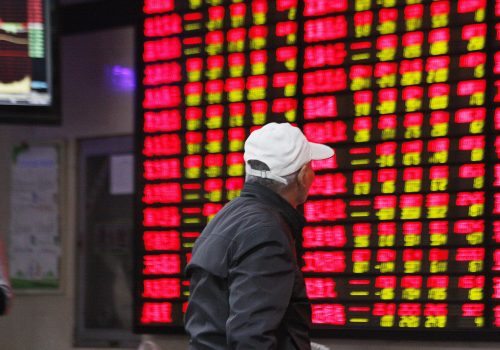The future is here: A guide to the post-COVID world 01/08/2021
Welcome to your guide to where the world is headed during the pandemic era and beyond. Each week, we’ll bring you the latest and most significant expert insights and international news about how coronavirus is reshaping international affairs. To stay updated each week, sign up to the newsletter here.
Let’s take a spin around the globe, in seven minutes or less.
In top stories this week:
- An alarming new adversary: It isn’t just the United Kingdom that must be ready to fight the new COVID-19 variant.
- The global economy may experience better days this year, but rising infections and challenges with vaccine distribution could still hamper the recovery.
- It’s decision time for the Olympic Games in Tokyo—and a long-time dispenser of magazines and good cheer bridles at ageism in Italy.
- But first…
The big story
This week’s key theme: There are overlooked signs of hope even as the COVID-19 crisis reaches a climax
As the world faces what may be the most dire moment of the pandemic so far, we would do well to recall the words of the poet Emily Dickinson: Hope can be found “in the chillest land” and “on the strangest sea.”
In the United Kingdom, for example, daily deaths are at an all-time high amid a new COVID-19 variant that spreads much faster. But while health-care workers and other experts have voiced misgivings about UK Prime Minister Boris Johnson’s ambition to inoculate about fourteen million people by mid-February, the arrival of the AstraZeneca-Oxford vaccine does offer cause for hope. Almost one in four people over eighty years old in England have already had one dose of a vaccine, and the Oxford shot in particular is relatively cheap and easy to transport. That said, the logistical challenges ahead are immense (not just in the United Kingdom but in every country). And the decision in the UK to prioritize the first vaccine dose has divided scientific opinion, since it stretches out the interval between the first and second dose to an extent that has not been tested for efficacy.
In the United States, meanwhile, the infectious-diseases expert Anthony Fauci sees “some little glimmer” of hope as the vaccine rollout gradually builds momentum there. Indonesia, the world’s fourth-largest country by population, will soon start mass inoculations. In Europe, where vaccines have been slow to get into arms in Germany, the Netherlands, and France, regulators have approved Moderna’s vaccine—as has the health ministry in Israel, among the many countries to set tough new restrictions on movement as infections increase. And while it’s certainly in a league apart from the world’s larger countries, the tiny island nation of Palau may be poised for a big achievement: becoming one of the world’s first to inoculate its entire population.
Subscribe to The future is here: A guide to the post-COVID world
Sign up for a weekly roundup of top expert insights and international news about how coronavirus is reshaping international affairs.

The world in brief
Insights from across the planet, in ten bullets or fewer
- First spotted in the United Kingdom, the new coronavirus variant is going global. It’s unclear whether the new B117 variant, which spreads more rapidly, originated in the United Kingdom or was simply spotted there first. But it’s showing up elsewhere too, including the Netherlands, Italy, and the United States—with a swifter, different variant in South Africa. A Spanish lab has identified B117 in two patients with no known links to the UK, says the Financial Times, while the strain has been identified as far afield as Australia and possibly in Colombia too.
- QUOTE: “One concern is that B117 will now become the dominant global variant with its higher transmission and it will drive another very, very bad wave,” Science magazine cites Jeremy Farrar, an infectious-disease expert who heads the Wellcome Trust, as saying. “[W]e’re going into an unpredictable phase now” as a result of the virus’s evolution.
- The Eurozone is at risk of a return to recession. Rising infections and fresh restrictions weighed on the services sector in the Eurozone, prompting a likely drop in economic growth in the final quarter of 2020. With little prospect of a rebound in the months ahead, the currency area may fall back into recession, The Wall Street Journal reports. Meanwhile, administrative bottlenecks in Italy and Spain, the top two recipients of the European Union’s COVID-19 financial-support package, will curtail spending of the aid, the Financial Times cites economists and other experts as saying.
- The numbers say… While the World Bank expects the global economy to expand 4 percent this year, after a 4.3-percent decline in 2020, rising infections and delays to vaccine distribution could limit that growth to 1.6 percent, Reuters reports. In its semi-annual forecast, the bank noted that the collapse in economic activity was slightly less severe than expected, but the recovery still faces considerable risks.
- QUOTE: “Estimates of 2020 gross domestic product that survey the hit to national production loom large in public debate and in comparisons across national economies,” Daniel Mügge, a professor of political arithmetic at the University of Amsterdam, writes in the Financial Times. “Yet they hide both good and bad news under the rubble of the pandemic and are useless in navigating our economies.”
- Politics is frustrating a Wuhan research trip. The World Health Organization (WHO)’s research trip to investigate the origin of the pandemic has been in the works for almost a year, The Washington Post reports. But on January 5, WHO Director General Tedros Adhanom Ghebreyesus criticized China, voicing “disappointment” that Beijing has yet to finalize arrangements. While we’ve made considerable inroads in understanding the pandemic, a chasm remains: We still don’t know how it began, Bloomberg says.
- Trending upward: global shipping, movies in Asia, and conferences. Although pushed to record highs by pandemic-era consumer spending, global freight rates are still increasing and there’s no inflection in sight, Bloomberg cites the biggest container carrier, A.P. Moller-Maersk, as saying. Movie theaters in Asia have the wind in their sails too according to Imax, attracting customers in droves—a marked contrast to the woes of US box offices, the newswire also reports. Meanwhile Informa, the world’s biggest events organizer, expects many conferences and events to start again in six months as vaccine rollouts boost consumer confidence, the Financial Times reports.
- What’s going down? New York real estate, US savings, and Korea’s birth rate. Architect Frank Gehry’s luxury New York City skyscraper has high-end chops but is low on tenants. Since almost a quarter of the nine hundred units became vacant during the pandemic, there are deals to be had for renters, The Wall Street Journal says. Meanwhile, a record number of cash-strapped Americans had to draw on their savings in December to make ends meet, Bloomberg says. The pandemic has also contributed to a drop in South Korea’s population amid job losses and a decline in marriages, the Journal reports separately.
- Tick tock: It’s decision time for the Tokyo Games. The countdown to the postponed Summer Olympics has hit the two hundred-day mark. Officials promised to set out concrete plans this year about how to get fifteen thousand elite athletes as well as hundreds of thousands of spectators, judges, and the media into Japan during the pandemic, The Associated Press reports. A December poll by Japanese broadcaster NHK shows 63 percent of the Japanese public want the Olympics canceled or postponed. Meanwhile Dick Pound, a senior member of the International Olympic Committee, says he “can’t be certain” the Games will go ahead after host city Tokyo declared a state of emergency, The Guardian reports.
- No “bell jar” for an elderly Rome kiosk owner. Self-employed older people like Armando Alviti, who has dispensed newspapers and good cheer for more than fifty years in Rome, “can’t be kept under a bell jar” amid curbs meant to protect them, he says. Alviti, who is seventy-one years old and diabetic, is enraged by an Italian politician’s view that his age group is economically unproductive. He’s struck a compromise with his family, who want him to stay home: One of them opens the kiosk at six o’clock in the morning, and he takes over two hours later to limit his exposure to customers in the morning rush, The Associated Press reports.
The inside scoop
Insights from the Atlantic Council



